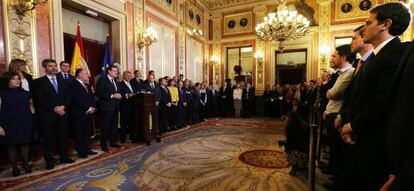What happens now if there’s no majority to form a government?
King Felipe will now play a key role in negotiations to vote in a prime minister There will be new elections if a leader is not found two months after first round of voting


The tremendous fracture lines that run through the newly elected Congress will make it difficult to create a stable government.
As the public displays of euphoria and disappointment ebbed away after Sunday’s election, Spanish parties began the arduous task of seeking out deals and alliances to find a new prime minister that everyone can agree on.
The procedure is encoded in article 99 of the 1978 Constitution, which says that the king will propose a candidate and the latter will be sworn into office if he or she is backed by an absolute majority of deputies – or failing that, by a simple majority (more yes votes than no votes) in a second round to be held 48 hours later.
If the worst-case scenario were to unfold, this would mean a new general election in Spain in early 2016
If a simple majority of more votes in favor than against is still not achieved, the monarch may put forward new names. And if the gridlock is not broken two months after the first vote, parliament will be dissolved and a new election called.
If the worst-case scenario were to unfold, this would mean a new general election in Spain in early 2016. Such a situation would be unprecedented in Spanish democratic history.
While designating a new head of the executive is a task that falls essentially to Congress, in such a context of political division as Spain faces right now, the king could conceivably play a mediating role to help parties find enough common ground to support one of the main candidates.
The procedure will officially begin on January 13, when the new deputies get sworn in and a speaker is elected. That is when Felipe VI will propose a nominee to head the Spanish government, based on election results and on talks with the leaders of the parties that made it into Congress, who will explain their position to him.
When a party obtains an absolute majority at the election, this step is a mere formality, as the prime ministerial nominee is certain to receive enough support in the first vote.
When the election results are not so clear, the king plays a decisive role in resolving the governmental crisis
“But these consultations are more important when the election results are not so clear; in that case, the king plays a decisive role in resolving the governmental crisis,” writes Antonio Bar Cendón, professor of constitutional law, in a 1996 study on the subject.
From a legal standpoint, this is one of the few times when the Spanish head of state gets to play a larger role in the nation’s politics, as his role is mostly diplomatic and symbolic in nature.
If there is no absolute majority, “the king’s freedom of movement is greater, though not in the sense of proposing whomever he likes best, but in the sense of playing a more active role as a mediator between the various forces, in order to craft a proposal that will get the biggest possible backing,” notes Bar Cendón.
Voting is public, with each deputy being called by name and asked to cast his or her vote. This effectively prevents the possibility of isolated deputies breaking with the parties’ agreements.
From a legal standpoint, this is one of the few times when the Spanish head of state gets to play a larger role in the nation’s politics
If the nominee gets at least 176 votes, he or she gets to be the next prime minister of Spain. If not, a new vote is held 48 hours later, with the only requirement being more votes in favor than against.
So far, Spain has never had to move beyond this second vote. But if that were to happen now, the king would meet with party leaders again in a bid to find a new consensus candidate, and the two-month countdown before new elections would begin.
Since the first democratic elections of 1977, an average of 11 days have elapsed between the time that the king announces the official prime ministerial nominee and the moment that the latter gets sworn into office.
English version by Susana Urra.
Tu suscripción se está usando en otro dispositivo
¿Quieres añadir otro usuario a tu suscripción?
Si continúas leyendo en este dispositivo, no se podrá leer en el otro.
FlechaTu suscripción se está usando en otro dispositivo y solo puedes acceder a EL PAÍS desde un dispositivo a la vez.
Si quieres compartir tu cuenta, cambia tu suscripción a la modalidad Premium, así podrás añadir otro usuario. Cada uno accederá con su propia cuenta de email, lo que os permitirá personalizar vuestra experiencia en EL PAÍS.
En el caso de no saber quién está usando tu cuenta, te recomendamos cambiar tu contraseña aquí.
Si decides continuar compartiendo tu cuenta, este mensaje se mostrará en tu dispositivo y en el de la otra persona que está usando tu cuenta de forma indefinida, afectando a tu experiencia de lectura. Puedes consultar aquí los términos y condiciones de la suscripción digital.








































